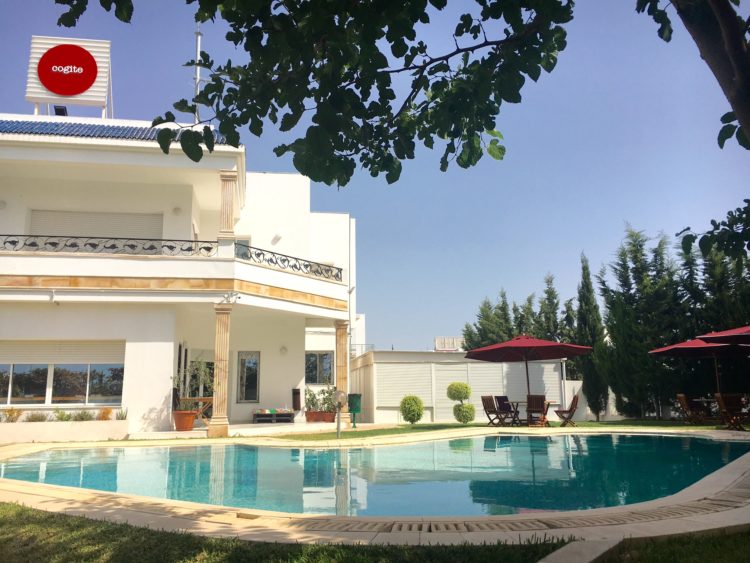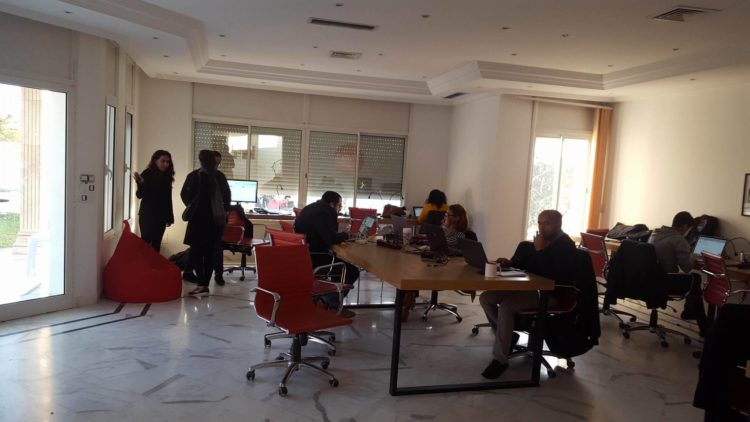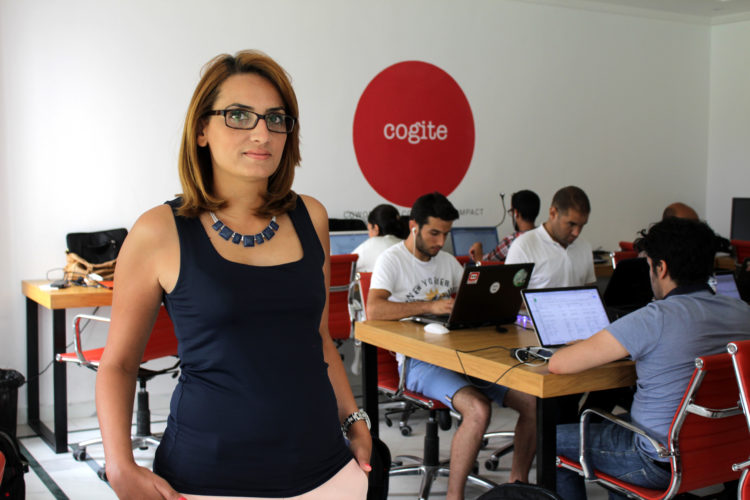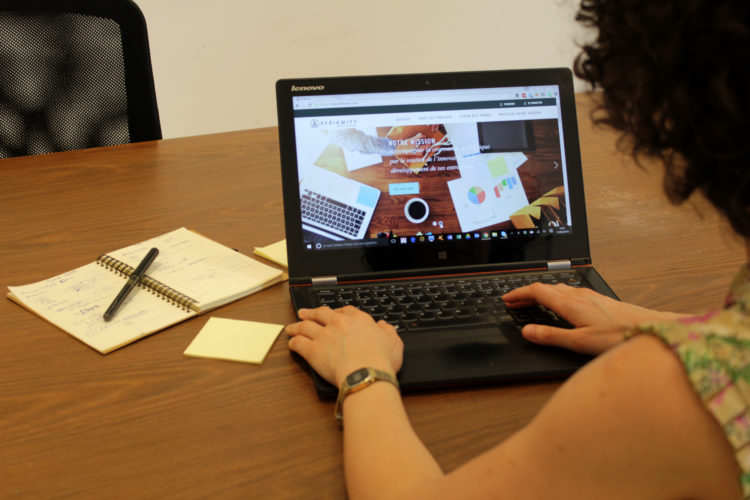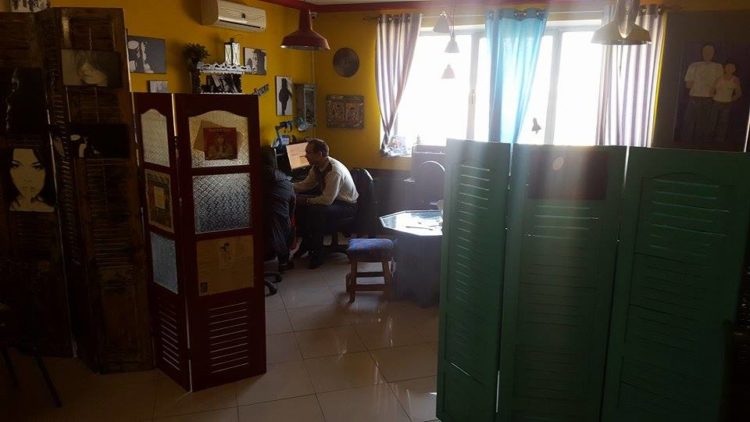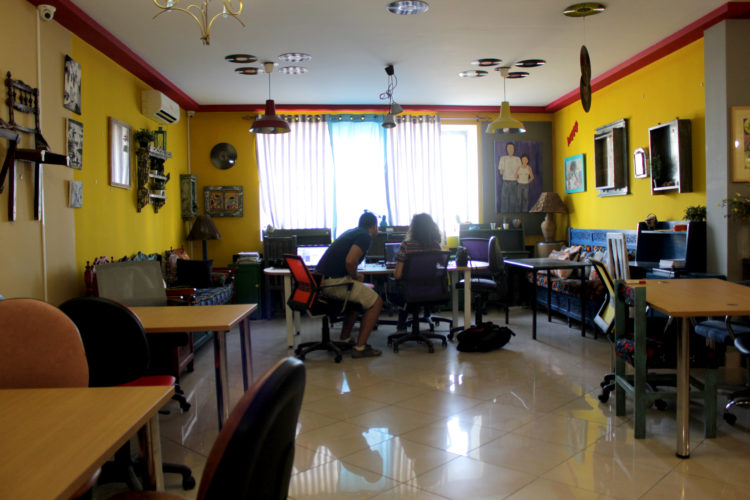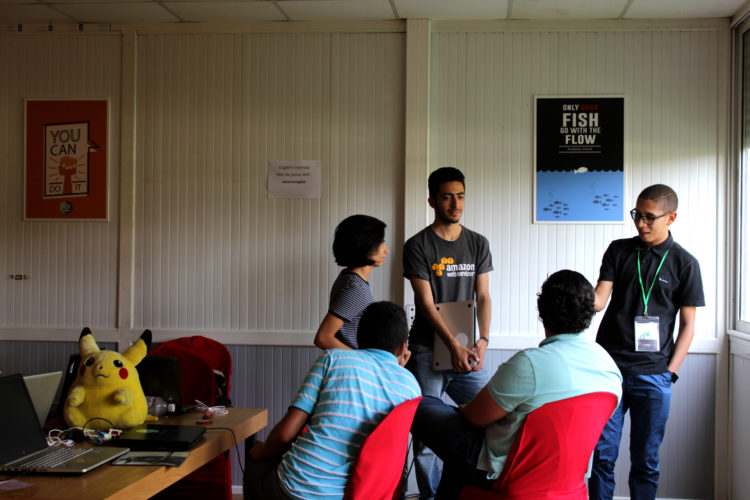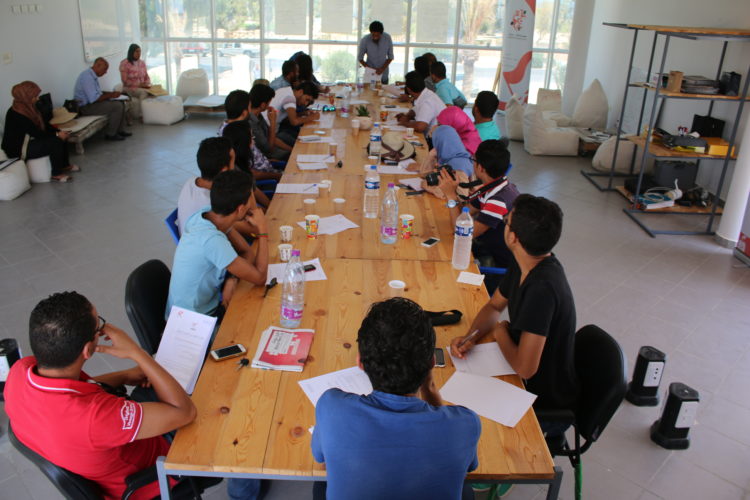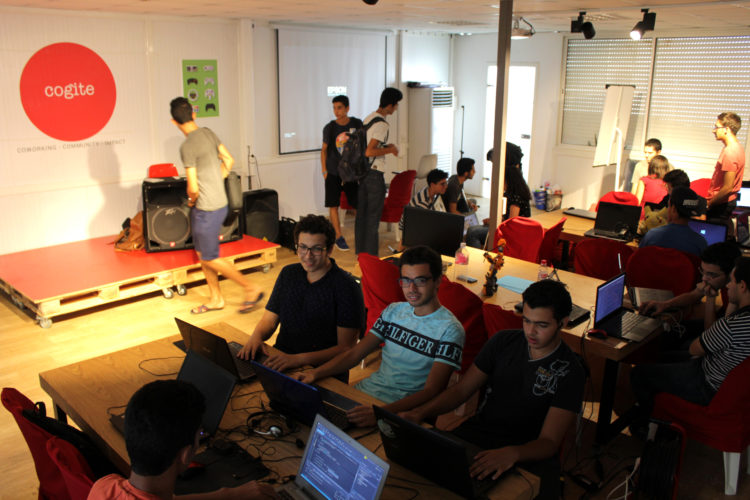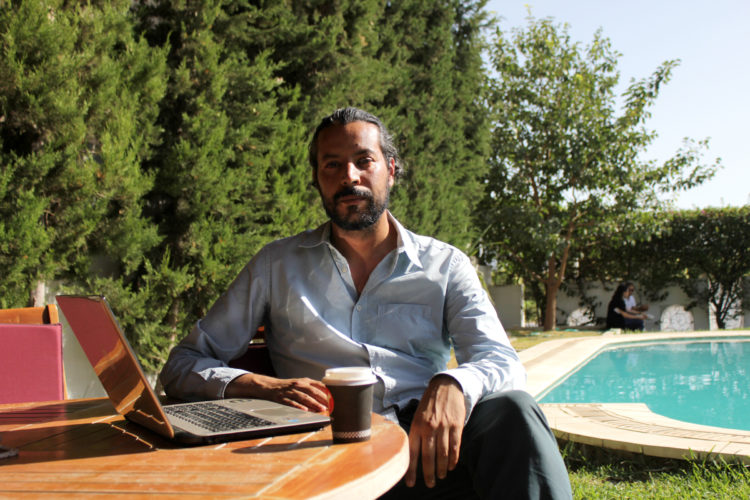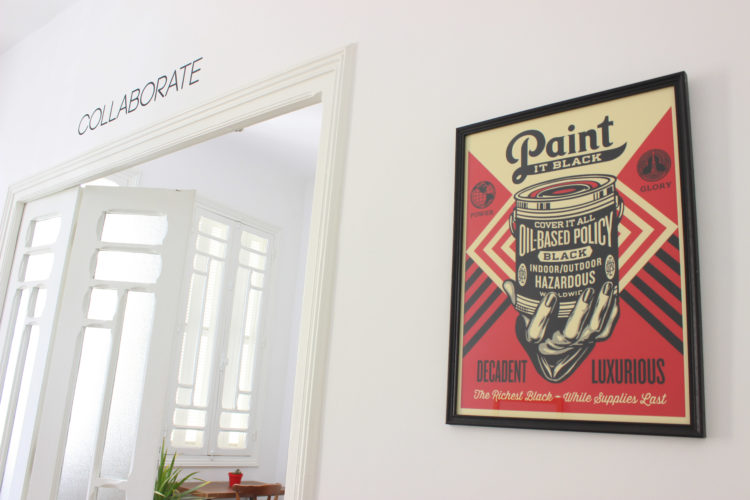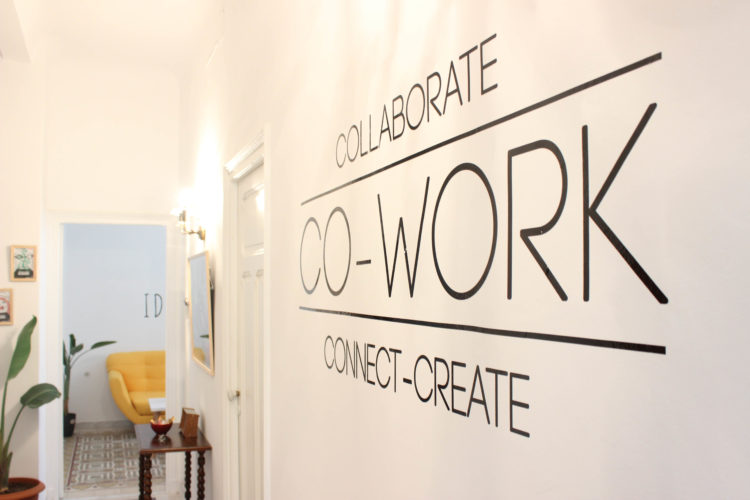Five years after the Arab Spring, Tunisia is still struggling with the experience of democracy, youth unemployment and the lure of ISIS.
But some young people, fed up with stalemate and a lack of options, are taking things into their own hands. These young entrepreneurs are setting up co-working spaces where they can network, collaborate, build businesses and rebuild their country.
In the business district of the Les Berges du Lac in Tunis, the red sign of Cogite co-working space can be seen from two blocks away. When you enter the whitewashed villa, a bike and a swimming pool invite you to join ‘la crème de la crème’ of new entrepreneurs in Tunisia. This may not be the Silicon Valley office of an American start-up but its tenants act as if it is.
They dress in casual clothes and sneakers — and when they want a break, they go to the basement to watch a movie or take a nap. Cogite was created in 2013. ‘The place was thought of as a bubble for entrepreneurs, a sort of shelter,’ Houssem Aoudi, one of the co-founders explained. ‘The best way to help people who want to make things change is to give them a space, a home.’
Houssem wants to encourage self-employment and liberate a generation who have struggled with unemployment. ‘We must stop with criticism and negativity,’ Many Tunisians are disillusioned with the revolution.
On the other side of town, the Creativa co-working space, in the northern suburb of Tunis, la Marsa is for architects, photographers and designers. It has been running since the beginning of 2016.
Founder Akthem Naili, wanted to create a ‘professional club’ to enable young creators to work because many of his colleagues could not afford to pay a rent for an office downtown. He also knew from personal experience that many wanted to accelerate the networking process between people from the same creative worlds.
Between 2013 and 2016, at least five co-working spaces have popped up in Tunis.
Creativa organises events like ‘How to make a speech in front of an audience’ and training sessions for various skills from storytelling, business pitching to managing stress. In July, they organised speed dating sessions and also feng shui workshops as a way to promote ‘well-being’ at work.
Between 2013 and 2016, at least five co-working spaces have popped up in Tunis. Despite a high unemployment rate of 15.3 per cent in 2014, young Tunisians have skills to offer and ideas to promote. But it is difficult; there is no updated legal framework for start-ups or financial lending support from the banks.
But these co-working spaces have become more than places to work, they are places where young people can collaborate and network but they can also dream and draw the future of Tunisia.
Like many others in the incubator, Houssem Aoudi, who studied marketing in Tunisia, is himself an entrepreneur. Even before a revolution that turned the country into a laboratory for new models of democracy, Houssem was working in organising the first TEDx event in the country.
They first invested 9,000 dinars (around £3000) in a small space, then rented this deluxe villa.
But starting from scratch is not always easy. Houssem created Cogite with his friends Rym Baouendi and Zied Mhirsi alongside each of their own start-ups. Money made from Cogite is reinvested in the co-working space to promote its events. They first invested 9,000 dinars (around £3000) in a small space, then rented this deluxe villa in the Lake area in order to look more like a real firm. They have different types of subscriptions/rent structures for the 500 members who come here to work. At least a hundred come on a daily basis.
Hela Jelassi who worked for an international incubator, Faster Capital based in Dubai took advantage of the place to find interesting projects to invest in and to help.
‘The main challenge is to advise and help the young entrepreneurs who lack support,’ she she says, wearing a business suit, as we chat outside, and some co-workers are milling around on a cigarette break outside Cogite. She and her partner created ABC Consulting, a startup that aims to train and advise young entrepreneurs in Tunisia.
One of the other challenges of the fledgling democracy and its fresh entrepreneurship culture is that the lack of official statistics on the start-up boom or any information on the ecosystem of this particular sector. There have been attempts to track growth: 97 starts-up hace signed up to the Manifesto on TunisianStart-ups. Most entrepreneurs are between 25 and 44 years old. Starts-ups are mainly focused on improving health and transport services as well as e-business.
Other young Tunisians are more focused on the links with the diaspora.
Nine Tunisians were invited to the last Silicon Valley summit, a global entrepreneurship summit. Among them was a woman, who created website ‘AlloTabib‘, (AlloDoctor) which reduces wait-time at the doctor’s office and helps you find a doctor nearby. There is also E-taxi, an app for ordering cabs rather than waiting for one on the curb in Tunis. Other young Tunisians are more focused on the links with the diaspora, such as the founders of Afrikwity who created the first crowdfunding platform for Africa in 2016.
‘The idea was to enable the African diaspora to invest in projects in their home country using Afrikwity, a pioneering equity crowdfunding platform in Africa,’ said Amina Nasri, one of the co-founders. While working between Paris and Tunis, she and fellow co-founder Thameur Hemdane, who is also the CEO, realised that many Africans living in France were interested in promoting projects or supporting young starts-ups in their native countries.
They had to create the start-up in France because ‘crowdfunding is regulated and has a legal framework here. In Tunisia, for instance, it is not yet implemented, so we also have to promote the crowdfunding culture,’ she said. Amina works at Cogite when she is in Tunis and in a French co-working space when she is in Paris. Tarek, a co-founder and head of operations in North Africa, works in the Cogite space.
She is not the only one who mentions how difficult it is for young entrepreneurs to obtain low-interest loans. Some of them have given up on the idea and pursued other capital alternatives, such as Akram Dhane, the founder of a co-working space in downtown Tunis. ‘I preferred to invest family money to avoid going to the bank.’ He raised 10,000 dinars (around £3,500 pounds) to launch it independently.
His space, called Jasmine Hall, in the business district of Urban North centre of Tunis looks like a hipster café with coloured walls, flowery cushions and wooden desks. He opened with the help of Cogite in 2015 and offers a similar subscription but for people who prefer to stay in Tunis rather than going to Le Lac. When we went there, a woman was working on her marketing thesis near a man who was creating a new media outlet.
‘There is really a will of sharing and putting away hierarchy barriers among the young people here,’ Akram says. The fees to work at Jasmine Hall is 150 dinars (£51) for unlimited access on a monthly basis. ‘For now, we are not making a profit but it is getting there and I have no debt,’ Akram said.
Many do the same as Akram and use their own money rather than borrowing from banks… The fear of slow bureaucratic processes and the lack of trust in institutions are the main reasons. According to a report from the BIAT foundation, one of the six major obstacles for Tunisian entrepreneurs is access to finance, particularly when firms are at an early stage. Banks simply don’t want to take the risk. Administrative steps for review and approval take a lot of time and are often discouraging.
You need guarantees that are quite hard for a young entrepreneur to get.
The report says ‘To get a loan, you need to get first an attestation of innovation which is quite hard to obtain, then the loan can take more than 18 months, and you need guarantees that are quite hard for a young entrepreneur to get when they start. ‘Money is behind many decisions to join co-working spaces.
At Cogite, I met Ismail Ben Sassi, the founder of Ilboursa, the first website in Tunisia specialised in the news of stock exchange. ‘I was among the first to join Cogite and I never left. You don’t have to worry about paying your rent, internet, or the cleaning person, everything is there and it is a way to reduce a lot of the charges.’ He is among the success stories of the co-working space. His revenue has gone from 15,000 dinars in the first year to 300,000 dinars in less than three years.
When he started his business, nobody knew this lone wolf.
‘We have 4,000 visitors to our website per day and we are exclusively financed by advertising and Tunisian investors.’ When he started his business, nobody knew this lone wolf who had most of his experience from working in France. ‘It was hard to enter the closed world of finance here but once you’re in and you show you are good at what you do, it works.’ Ismail made the Forbes rankings as one of the most 30 promising entrepreneurs for 2016 in Africa.
Young Tunisians need more success stories like his. According to the BIAT foundation and the Roland Berger consulting firm, which led a study on the economy of entrepreneurship in Tunisia, the numbers are low compared to other developing countries.
Many Tunisians want to succeed and have ambitions.
Yahya Bouhlel, 19, who works at Cogite, started coding in his room at the age of 15, in Sousse, a seaside town not far from Tunis. In a sweatshirt and glasses, he is definition of the geeky millennial. He has recently created, inside Cogite, a coding school.
‘After spending all my summers in the Silicon Valley doing internships and meeting hackers, my goal was to make it possible for every Tunisian in the country to have the same opportunity.’ He selected the most motivated from around the country and started Go My Code where you can learn to create your first digital game. ‘Many Tunisians want to succeed and have ambitions; we just need to show them more that it is possible.’ Yahya said.
In Start-up Haus which opened in The Passage – in one of the most connected areas in Tunis – the founders chose to combine a co-working space and training centre, with the financial support of a German NGO.
‘We have a programme of mentoring which is really part of our space with coaches and training teachers who really help the aspiring entrepreneurs here,’ Nessrine Ben Slimen the former manager of the place said in an interview just a few days after the official opening in early March.
Since then, they have welcomed lawyers and international experts to help the young people properly launch their business.
‘There are a lot of engineering students who are experts in new technologies but not in communication so they don’t know how to deal with this part,’ Nessrine explains ‘There is also the whole e-health sector and the social entrepreneurship which are blooming now in Tunisia but people don’t always have access to them because of a lack of communication.’.
We have an African and Arabic vocation. We need to break the barriers and to be able to grow on an international marketplace.
Jazem Halioui, another Cogite pioneer is the founder of WebRadar.me, a market research startup that helps advertisers and organsations in the MENA region capture insights by collecting and analysing online public content and social media conversations. WebRadar hired five of its interns through Cogite. The team of twelve also created Webticar, a data-journalism application for media outlets to help them in their online investigations and production of data visualisations. After twenty years in the world of entrepreneurs, Jazem Halioui is still optimistic despite the economic crisis in his country.
‘Our problem is that we are a very small market, too small to grow.’ There is also the difficulty of converting currency, which is weak. Attracting foreign investment can also be an issue. ‘We have an African and Arabic vocation. We need to break the barriers and to be able to grow on an international marketplace.’
Nessrine also considers the dinar as an obstacle. The ministry of technology and information has enacted a sort of prepaid card, la Carte technologique internationale, which allows young start-uppers to convert 10,000 dinars. This is small change if they want to expand or exchange on an international scale, especially since the use of the card is a onetime shot.
Rigid institutions and the lack of support from the bank paralyse the sector.
‘We have supported a new law project to improve all this but it is still at the assembly for now, waiting for a discussion on it,’ Houssem Aoudi says. The ‘Startup Act’ defines legally which businesses are in fact start-ups, and other common terms like business angels and crowdfunding. It is meant to help create a status for small start-ups.
Even if the potential is there to make Tunisia the Silicon Valley of Africa, rigid institutions and the lack of support from the bank paralyse the sector. Smart Tunisia, an organisation created by the Ministry of Communication Technologies, and its function is still unclear for many entrepreneurs.
‘There is a political will to make things move forward but the administration and the legal frame are really important obstacles against it,’ said Welid Naffati, a Tunisian journalist who specialises in new technologies.
The intent is clearly to promote employment and help young unemployed people find a job through start-ups. The Smart Tunisia programme aims at making Tunisia an offshore destination for foreign businesses but all the people we interviewed for this article agree that a law reform would help local start-ups more. Other entrepreneurs like Walid Sultan Midani quoted in a World Bank blog seem to think that change will come from the private sector first before any government initiative.
The American website TechCrunch picked out Tunisia as the next place to watch in 2016 in the Mena region, but the co-working space founders know there is still a lot of work to do.
The French-Algerian entrepreneur Samir Abdelkrim spent some time analysing Tunisia and other countries in Africa for his website Startupbrics and an upcoming book.
The best way to promote entrepreneurship in Tunisia is to show it as a resistance against terrorism.
He compares Tunisia to other countries: ‘The problem is that now Tunisia is in competition with Morocco on this, Tunisia used to be the champion ten years ago in investing in new technologies but Morocco is now a more important hub mainly because of security.’ Three terror attacks hit Tunisia in 2015 and the country is by far the largest source of foreign fighters heading to join Islamic State in Syria and Iraq.
But despite difficulties, many want to expand to the rest of Tunisia.
Houssem and its partners are supporting a new co-working space, Cozi, on the island of Djerba in the south of Tunisia and Passengers lab in Sousse is also for young creators and designers.
‘But in order to become a real attractive start-up hub like Chile or France for instance, we also need to promote Tunisia as a destination to work and invest in,’ says Jazem Haliouli. ‘We have a sunny weather, a strategic place on the African continent. We need to advertise this as well.’
‘The good card for Tunisia is that the country still has the best potential. They have one of the best school for coding in Africa, the engineering and business school of Esprit, and also the fact that the country is still a leader for the Arab Spring,’ said Samir Abdelkrim. ‘The best way to promote entrepreneurship in Tunisia is to show it as a resistance against terrorism and unemployment.’
For now, Cogite’s founders are glad to have made it into the ranking of the best co-working place to work in Forbes. The next step is to make it as top entrepreneurs in Africa catching up with Kenya, South Africa and Ghana who were the leading countries this year.
Jazem Halioui knows what is at stake: ‘Now we have a right to dream that we did not have before the revolution so we have to dream big.’

